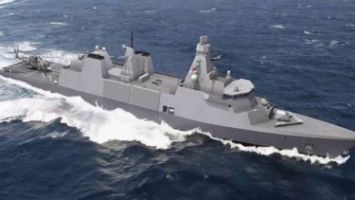Rolls-Royce announces new hybrid-electric flight demonstrator to be built with Brandenburg Partners

November 6, 2019 - Rolls-Royce has taken a significant step towards realising the ambition to provide hybrid-electric propulsion systems for the next generation of aviation, following the announcement of its initiative to strengthen research and development activities in this field in the State of Brandenburg.
Rolls-Royce will be working with APUS, an aviation engineering company based in Strausberg, close to Berlin, and the Brandenburg University of Technology (BTU), Cottbus, in developing a hybrid electric flight demonstrator based on its hybrid M250 propulsion system.
The project is being supported by the Brandenburg Government under the regional programme to develop research, innovation and technology (ProFIT), managed by the Investment Bank of the State of Brandenburg (ILB), and is scheduled for a duration of three years.
The collaboration will enable one of the world’s most comprehensive hybrid aerospace turbine engine development and integration programmes and pave the way for experimental flights on aircraft after 2021.
This project will include an APUS i-5 plane to demonstrate the practical application of hybrid electric technology for a 4000kg conventional take-off and landing flight test vehicle. The system could be used across a range of transport platforms to enable distributed electric propulsion, including EVTOL’s (hybrid electric vertical take-off and landing vehicles), general aviation aircraft and hybrid helicopters in the future.
Dr. Dirk Geisinger, Director Business Aviation and Chairman Rolls-Royce Deutschland, said: “We thank the Brandenburg Government sincerely for its continued support and are delighted to be working with APUS and the Brandenburg University of Technology on this groundbreaking demonstrator programme. This is an important step forward in developing propulsion systems that will enable a new class of quieter and cleaner air transport. At the same time this will further strengthen our Dahlewitz site, which is one of the hubs for the advancement of hybrid-electric propulsion in our company.”
Rob Watson, Director of Rolls-Royce Electrical said: “We have already ground tested the hybrid version of the M250 gas turbine in a demonstration setting in Series Hybrid, Parallel Hybrid and Turbo-Electric operating modes. The M250 hybrid is planned to be used as a propulsion plant with power ranging from 500kW to 1MW and has the potential to transform aviation power. Rolls-Royce has pioneered every significant development of the aviation industry and it is only natural that we play our part in this exciting next step of electrification.”
Prof. Dr. Georg Möhlenkamp, Chair for Power Electronics & Electrical Drive Systems, BTU Cottbus-Senftenberg said: “We are very pleased to be a partner within this important project. Being responsible for electric hybrid system functional modelling, dynamic modelling of system performance and electro-mechanical system test support acknowledges our strong competencies in this field and represents a first visible step in our strategy to collaborate with Rolls-Royce on sustainable aircraft propulsion.”
Phillip Scheffel, Chief Executive Officer, APUS aeronautical engineering GmbH, added: “As the supplier for the iron bird test airframe, installation hardware design and hybrid system installation partner, we are keen to take this project forward and to achieve experimental flight clearance together. Receiving funding from Brandenburg Government helps greatly to realise our exciting plans and enable significant learnings for a range of other electro hybrid aircraft systems.”
Funding for this hybrid electric flying project was requested within the framework of the ProFIT promotion guideline issued by the Brandenburg Ministry of Economics and Energy.
The application was submitted in the typical two-stage process with the support of Wirtschaftsförderung WFBB and the Business Development Bank of the State of Brandenburg, ILB. The financial ProFIT support is provided by the State of Brandenburg from the European Regional Development Fund and federal and state funds.
All project partners would particularly like to thank the ILB for the accompanying consultations and the European Regional Development Fund for the co-financing.
Rolls-Royce engineers based in the United States, UK, Germany, Norway and Singapore have developed the M250 engine into a hybrid-electric propulsion system.
The system demonstrator project announced today will integrate a M250 gas turbine engine with a high energy density battery system, electric generators, power converters and an advanced power management and control system.
The M250 hybrid power pack complements the AE 2100 2.5MW system being developed for larger aircraft, including regional aviation, and is being tested with Airbus on the E-Fan-X demonstrator platform.
The M250 gas turbine engine has powered more than 170 varieties of helicopters and fixed-wing aircraft, in both military and civilian service. Rolls-Royce selected this engine for its maturity, power-density, ease of maintenance, and high reliability. The total M250-powered fleet has logged more than 250 million engine flight hours, with more than 33,000 engines delivered to the market.
About Rolls-Royce Holdings plc
Rolls-Royce pioneers cutting-edge technologies that deliver clean, safe and competitive solutions to meet our planet’s vital power needs.
Rolls-Royce has customers in more than 150 countries, comprising more than 400 airlines and leasing customers, 160 armed forces, 70 navies, and more than 5,000 power and nuclear customers.
Annual underlying revenue was £15 billion in 2018, around half of which came from the provision of aftermarket services.
In 2018, Rolls-Royce invested £1.4 billion on research and development. We also support a global network of 29 University Technology Centres, which position Rolls-Royce engineers at the forefront of scientific research.
The Group has a strong commitment to apprentice and graduate recruitment and to further developing employee skills.
About APUS Aeronautical Engineering GmbH
APUS is an EASA certified Design Organisation based in Strausberg, Brandenburg, that offers high standard aviation engineering services. Main topics of development are innovative aviation propulsion systems, aeromechanical design, structural design, CAD and certification of aviation systems. In addition, the company offers industrial organization services as well as flight services and miscellaneous services in aviation.
About the BTU Cottbus-Senftenberg
BTU Cottbus-Senftenberg is as a research-intensive university in Brandenburg, Germany, with strong basic and application orientation. It is defined by the classical characteristics of a technical university.
At BTU the research area »Energy Efficiency and Sustainability« investigates measures for increasing the efficiency of conventional power stations and complex systems, for example, as well as measures that might make these more flexible. This includes the development of energy storage concepts, electric transport, and also the stability of the power networks in the context of the energy shift.
Efficient and environmentally compatible combustion engines, gas turbines, aircraft propulsion and micro gas turbine engines complete this research area. Other issues addressed also include new, optimised types of building with a focus on energy saving construction and design.
Another key issue in this research area is the automation and digitisation of industrial processes addressed by the »Innovation Centre Modern Industry Brandenburg«, for example.
About the European Regional Development Fund (ERDF):
The ERDF aims to strengthen economic and social cohesion in the European Union by correcting imbalances between its regions. The ERDF focuses its investments on several key priority areas. This is known as 'thematic concentration': Innovation and research; the digital agenda; support for small and medium-sized enterprises (SMEs); the low-carbon economy.







